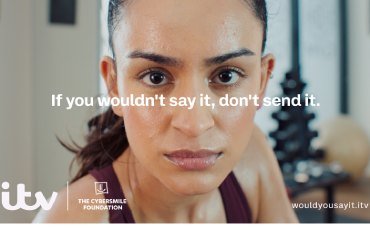
Mental Wellbeing
09 May 23
ITV has launched a new behaviour change campaign “Would you say it?” to tackle online trolling.
The campaign, which launched during an advert break in the England vs Brazil Women’s Football match on ITV1 will be broadcast across ITV’s channels. It has been developed in partnership with The Cybersmile Foundation, the nonprofit specialising in tackling all forms of bullying and abuse online, and aims to target people who make hurtful comments online but pass it off as ‘banter’. This group, called ‘casual critics’, are responsible for the majority of trolling-type behaviour and don’t see what they do as wrong because they don’t see the real world impact their comments cause.
Through three creative executions developed by ITV Creative, unsuspecting social media users come face-to-face with the people at the receiving end of their hurtful comments. No longer able to hide behind the screen, the adverts show the impact of their comment and invite the viewer to think twice about what they post through the end line: “If you wouldn’t say it, don’t send it”
The campaign signposts audiences to WouldYouSayIt.itv, which includes guidance about online commenting and points to the Cybersmile Foundation’s website - www.cybersmile.org - for specialist advice and support for those experiencing more serious types of harassment online.
The campaign is part of a wider initiative by ITV to tackle online abuse, with new training materials for people participating in shows produced or commissioned by ITV being launched today. The Social Media Awareness Hub helps participants navigate any unwanted attention from social media following their appearance, building on existing welfare support offered to show participants before, during and after filming.
Online trolling is an increasingly common issue. New research commissioned by ITV shows that almost one third of UK adults aged 16+ have received some form of negative comments online, with this increasing significantly for 16-34s1. Posting negative comments online has become so normalised that over half (51%) of adults aged 16+ say that if people “don’t want to receive negative comments, they shouldn’t post on social media.”2
Scott Freeman, CEO of The Cybersmile Foundation said: We are proud to partner with ITV on such an important campaign. Unfortunately too many people are unaware of the potential impact that our words can have on those that we interact with online. We want this campaign to remind people that comments and words shared online carry great power and that we need to consider our use of them in the same way that we are mindful of what we say offline.
Susie Braun, Director of Social Purpose at ITV said: So much of our lives are now spent online so it’s important to think about our mental wellbeing there too. Trolling dressed up as “banter” is having a real impact on lives beyond the screen, which is why ITV is proud to partner with Cybersmile to do our bit in making a difference.
Further information on the campaign is available at www.wouldyousayit.itv
Credits:
Shane O'Neill - Creative Director
Jill Findlay - Executive Producer
Rosie Gilligan - Campaign Management Lead
Michael Baldwin - Director & Senior Creative
David Brooks - Senior Creative
James Hillhouse - Senior Strategic Planner
Andy Sawyer - Editor
Anthony McElhinney - Dubbing Mixer
Louise Leaver - Design Producer
James Copeman - Lead Designer
Chris Sarris - VFX Designer
Michael Jackson - Designer
Crawford Wilson - Designer
About ITV’s Social Purpose
This campaign is part of ITV’s Social Purpose, which since 2019 has focused on mental wellbeing, through campaigns such as Britain Get Talking supported by Mind, YoungMinds and SAMH, and ITV2’s #WhatGetsYouThrough in collaboration with CALM. The impact of trolling on mental health is significant, with wider research showing that 41% of people who experienced cyberbullying went onto develop social anxiety.3
Research summary
Date: January 2023
Sample: 1,001 adults aged 16+
Conducted by: YouGov
- Almost one third of UK adults aged 16+ have received some form of negative comments online
- 16-34s are around four times more likely to say that they have been trolled (harassed or treated negatively) by someone they didn’t know online compared to those aged over 55.
- 93% of adults aged 16+ agree that people say things online that they would never say in real life
- Over half (51%) of adults aged 16+ say that if people “don’t want to receive negative comments, they shouldn’t post on social media.”
1 YouGov, Jan 2023, nat rep sample of 1,001 adults aged 16+
2 YouGov, Jan 2023, nat rep sample of 1,001 adults aged 16+
3 Ditch the Label research, 2020

